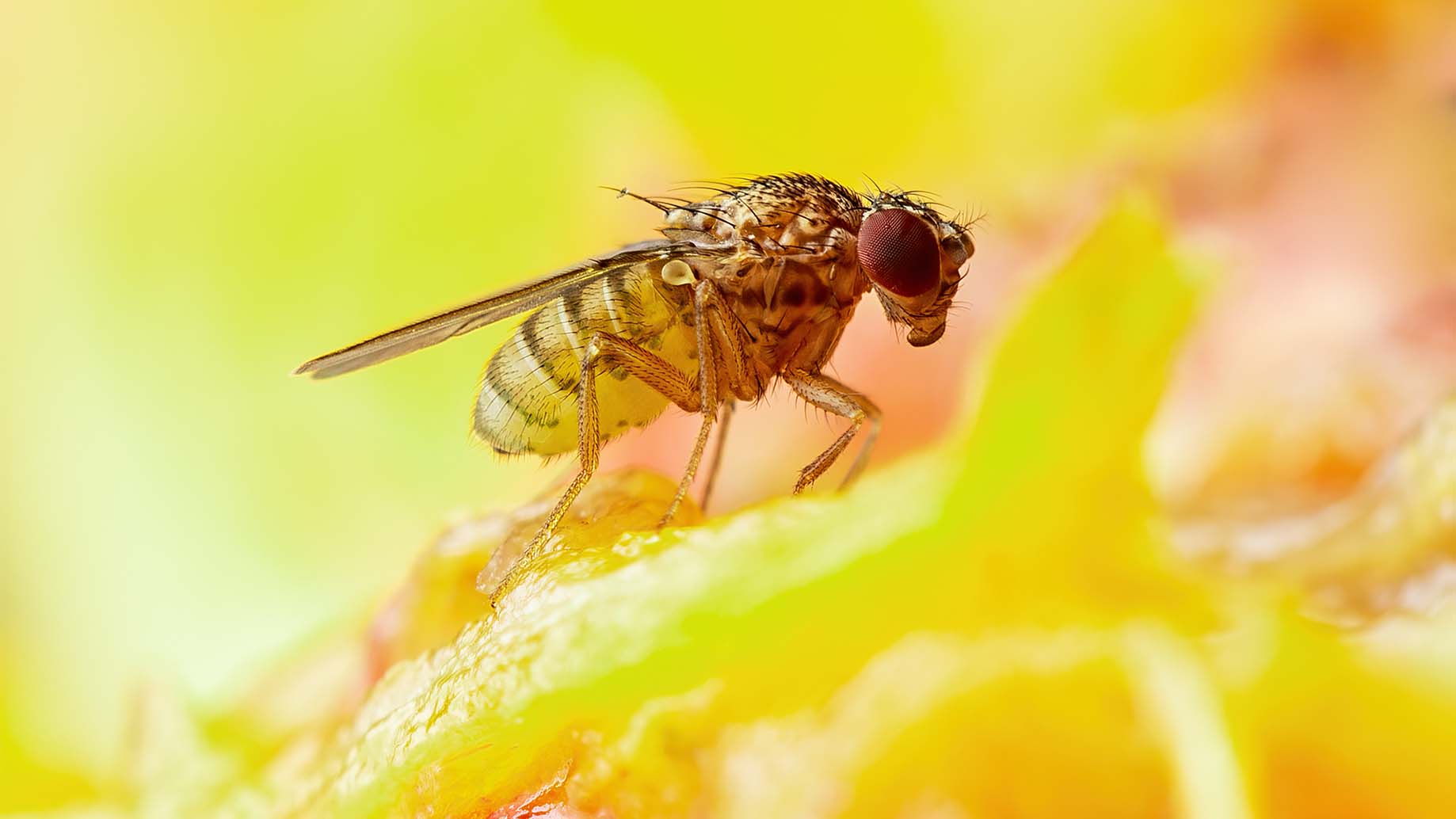Having been born on, worked on and owned my own orchard, I am quite familiar with this pesky little fly. They can destroy a whole crop because infested fruit is rejected at the market. Inspectors at the market are watching for damaged fruit and it only takes one to be infested and the whole lot are thrown away and burned—it can’t be trusted to be good fruit.
To get His message of salvation across to people, Jesus used parables that involve nature or what they were familiar with, namely sheep, wheat, fruit and so on. He spoke about moths corrupting things but apparently there were no fruit flies in His day as He never mentioned them.
Fruit flies seem an unusual subject to talk about, but anyone with a fruit tree in their garden has problems with this nasty little creature. It doesn’t eat the fruit but uses it as a host for its larvae. The only way to effectually prevent destruction of you crop is through regimented baiting. Miss one week and they are back.
There are good lessons to be learned here because these flies are very similar to our sin problem. The fruit looks beautiful until it is opened but it is rotten inside. Just like us. We look all right from the outside, but it is inside of us—our hearts and minds—that is all twisted and knotted up with sin’s infestation. We need help from outside of ourselves to get rid of this problem in our lives to bear good fruit as we were ordained by God to do (Ephesians 2:8–10). We all are infested “sinaholics” who must abstain from sinning or doing what is wrong (1 Peter 2:11) or we will be rejected by the “Buyer” at the harvest, the coming of Jesus. God and His inspectors, the angels, are working today to sort out the good fruit from the bad.
James 3:18 talks about the fruit of righteousness, so if there’s fruit there must also be trees. Righteousness (the opposite of sinning) is just a word for doing what is right. But how do we know what IS right? Is it just doing what we think is right? Fortunately God in His love and mercy has given us a gauge or standard to follow—His law. This law tells us what is right and, of course, what is wrong. Sin or disobeying God’s law is simply being nasty, mean and unkind to both God and mankind.
In Isaiah 61:1-3, quoted by Jesus in the synagogue, it says Jesus first sets us free from Satan’s prison of sin and addictions and then calls us trees of righteousness that He plants in us to glorify Him (v11).
God is the Orchardist or Gardener, not us, but He can only plant His trees in those who desire to bear fruit to His glory. He just loves seeing His trees grow in us. Good fruit, free from infestation, makes the Gardener happy (John 15:16). Also we ourselves must choose the right gardener or our fruit could be very unpleasant and have “disagreeable traits of character”, or produce sour fruit (Isaiah 5:1-6).
If it is our desire to make the right choice and understand how to do what is right; and be free from “infestation” of sin and its problems, God has planted in us three different types of trees to demonstrate what doing right is. Each tree has fruit with segments similar to a mandarin or orange. Each fruit’s segments must be complete (there can’t be any segments missing) or it is rejected at the market (God’s harvest). God leaves us in no doubt in understanding what righteousness involves by these trees and their fruit.
1. The first tree of righteousness defines and describes what doing right is, namely the standard of God’s government—the Ten commandments. Read Exodus 20:1-17. God first set the people free from slavery (sin) to be able to keep His law. lf everyone kept this law, what a happy place the world would be—everyone doing what is right. This fruit has 10 segments. (commands). If one segment is missing it has to be thrown out (James 2:10), because it is incomplete. You can’t sell oranges with one segment missing! God wants to implant this tree, His law, in our hearts and minds to prevent the infestation of sin (Psalm 40:8).
2. The second tree reveals to others and God whether we are obeying the law and are producing the fruit God wants us to bear—the Fruit of the Spirit, or God’s law. This is the first tree in action (Galatians 5:22-26). All laws are made to be acted upon with an attached penalty to give them their authority. This fruit contains nine segments (love, joy, peace, long-
suffering, goodness, gentleness, meekness, temperance and faith) all as important as each other. If one of these segments is missing, all the other segments can tend to glorify self and not God—a counterfeit righteousness. Eg. There can’t be genuine peace without love, goodness (righteousness) etc, or one complete fruit. Other people know us by our fruit. This is why it is called fruit—not fruits.
3. The third tree’s fruit has three segments in it and it reveals just how God our Gardener produces this good fruit of obedience (doing His will) in us to His glory. He saves us from the penalty, the power and the presence of sin. This is God’s work—not ours. The first segment of the third fruit is Christ’s justification (His pardon and mercy). This destroys the infestation of sin. The second segment is His power to transform our lives to keep producing good infestation-free fruit. Our natural fruit is infested with the “maggots” of sin, but if we recognise (confess) our sin problem and it is our desire to allow God to produce good fruit in us, Jesus forgives (justifies) and cleanses us and gets rid of all of our infestation (1 John 1:9). Jesus also keeps, transforms and empowers us to be free from being “flyblown” again with the “eggs” of sin (Romans 12:1,2). The devil can’t stand righteousness and he will “fly away” from us. The third segment of this fruit is the day when our bodies will be changed from mortality to immortality (no more dying) when Jesus comes at the end of the world and our Gardener has produced perfect fruit in us free from infestation or corruption with no segments missing (doing what is right), and we are now ready to be picked for the harvest to be taken home to where Jesus lives (John 14:1-3; 1 Corinthians 15:50-56).
The “bait” that we use to prevent sin’s infestation is a daily application of the righteousness of Christ in our lives. We all need this because we naturally don’t possess this goodness, so Jesus gives His righteousness to us to apply and appropriate. It is a miracle of His love and grace, but we must ask for it as God does not force Himself on anyone. This is the only way we can keep our fruit from going bad. In one way we are like jars of jam! Jude 1 says God the Father sanctifies us (gets rid of infestation) and then Jesus the Son preserves us. Jude 24 says Jesus keeps us from falling (going bad) and presents us faultless before our Father with exceeding joy. This prevents the destruction of the good fruit God wants to bear in the garden of our hearts for His glory (Psalm 23:3). It is all His work in us. Our part is seek, search and have a hunger to do what is right out of our love for our heavenly Father, then let Him do it in us.
The coming of Jesus will be the end of the old “Fruit Fly”, Satan himself: the destroyer and deceiver of everything God made good for our eternal happiness. Colossians 2:10 tells us to be complete (nothing missing) in Him—no infestation of sin or missing segments in our fruit—and then we can meet Jesus in peace because we will be like Him, our Gardener, when He appears, ready for God’s garner (kingdom) today (1 John 3:2,3).
The Bible does mention another tree—the tree of life. God did not create us to die. Because of Adam doing what was wrong, this tree was forfeited and taken away.
But today we can have the blessed assurance that this tree will once again be our right if we love, honor and obey God and live forever in a new home He has prepared for us (Revelation 22:14; Isaiah 65:17-25).
I am looking forward to my new orchard where nothing will corrupt, infest with sin or destroy anymore. A place where only love, peace and happiness will reign for an eternity; it just won’t stop. There will not be any more “fruit flies” of sin in this new world God will make for us.
Eric Hort writes from Toodyay, WA.






